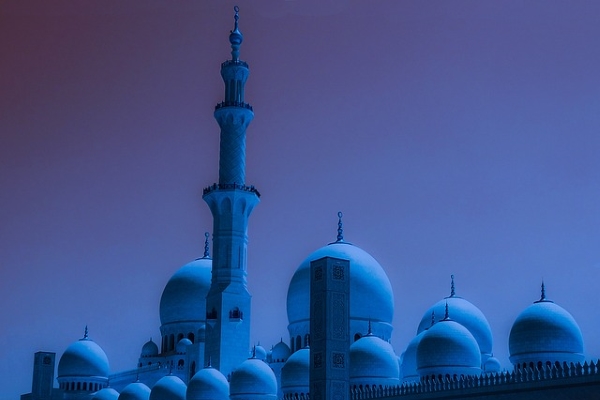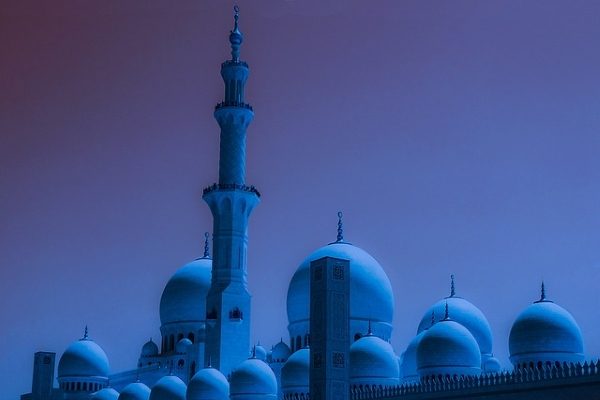

By: Moulana Muhammad bin Haroon
Source: Al-Miftah
The 15th of Sha’ban, which is commonly referred to as “Laylatul Bara-ah” (refer: Tafsir Razi and Ruhul ma’ani, Surah 44. Ayah: 3) is one of the significant nights in the Islamic calendar.
Ibnul Haj (Allah have mercy on him) states:
“The salaf (pious predecessors) would sanctify this night and prepare themselves for it in advance.” (Al-Madkhal, vol.1 pg.299)
Some people, due to being ill-informed actually refute the auspiciousness of this occasion. The following paragraphs serve to correct that false notion.
Ahadiths on the virtue of the night
There are several Ahadith (plural of Hadith) in which the merit of the 15th of Sha’ban has been discussed.
1) Amongst them is the narration of Sayyiduna Mu’adh ibn Jabal (Allah be pleased with him) that Rasulullah (sallallahu ‘alayhi wasallam) said:
“Allah Most High pays special attention to his entire creation on the fifteenth night of Sha’ban and forgives all of them except one who ascribes partners to Him and one who harbors enmity in his heart.” (Al- Mu’jamul Awsat, Hadith: 6776 and Al-Mu’jamul Kabir vol.20 pg.108-109)
Reliability of this narration
Imam Ibn Hibban (Allah have mercy on him) has classified this narration as sahih (authentic) and has included it in his book – Al-Sahih. (Sahih ibn Hibban; Al Ihsan, Hadith: 5665). ‘Allamah ‘Iraqi (Allah have mercy on him) has labelled it as sound (hasan) (Sharhul Mawahib; see footnotes on Musannaf ibn Abi Shaybah, Hadith: 30479).
Hafiz Al-Haythami (Allah have mercy on him) has mentioned that all the narrators of this Hadith are reliable. (Majma’ al-Zawa’id vol.8 pg.65)
2) Sayyiduna Abu Bakr (Allah be pleased with him) reports that Rasulullah (sallallahu ‘alayhi wasallam) said:
“On the middle night of Sha’ban Allah Most High’s mercy comes to the first sky and He forgives all besides the polytheists and those who harbour enmity for their brethren.” (Musnad Bazzar and Shu’abul Iman of Bayhaqi, Hadith: 3546)
Reliability of this one
Hafiz Mundhiri (Allah have mercy on him) has classified this as sound (لا بأس به) in his Al-Targhib. (vol.3 pg.459)
Al Haithami (Allah have mercy on him) says: “Abdul Malik hasn’t been declared weak by Ibn Abi Hatim, and the rest of the narrators are reliable.” (Majma’uz Zawaid, vol.8 pg.65)
In fact, Hafiz Ibn Hajar (Allah have mercy on him) has also classified one of its possible chains as hasan (sound). (Al Amali Al Mutlaqah pgs.119-1222)
Abundant narrations
Besides the above two narrations, there are many other Sahabah (Allah be pleased with himm) that narrated Ahadith regarding the merit of this night. Among them are the following:
3) Sayyiduna Abu Hurayrah (Allah be pleased with him) (Musnad al-Bazzar, Hadith: 3551 and Amali of Ibn Sam’un. Hafiz Sakhawi (Allah have mercy on him) has said: “There are no narrators in this chain that have been declared unreliable.” Al-Ajwibat ul-Mardiyyah vol.1 pgs.325)
4) Sayyidatuna Aishah (Allah be pleased with her) (Sunan Tirmidhi, Hadith: 739, Musnad Ahmad, Hadith: 26018 and Shu’abul Iman, Hadith: 3545)
5) Sayyiduna Abu Tha’labah (Allah be pleased with him) (Shu’abul Iman, Hadith: 3551)
6) Sayyiduna Awf ibn Malik (Allah be pleased with him) (Musnad al-Bazzar, Hadith: 2048, see Majma’uz Zawaid, vol.8 pg.65
7) Sayyiduna ‘Abdullah ibn ‘Amr ibn al-‘As (Allah be pleased with him) (Musnad Ahmad, Hadith: 6642, classified as “layyin” i.e, slightly weak by Mundhiri and Haithami (Allah have mercy on them), Targheeb, vol.3 pg.460 & Majma’uz Zawaid, vol.8 pg.65)
8) Sayyiduna Abu Musa al-Ash’ari (Allah be pleased with him) (Ibn Majah, Hadith: 1390; Shu’abul Iman, Hadith: 3552)
9) Sayyiduna ‘Ali ibn Abi Talib (Allah be pleased with him) (Ibn Majah, Hadith: 1388; Shu’abul Iman, Hadith: 3542)
10) Sayyiduna ‘Uthman ibn Abil-‘As (Allah be pleased with him) (Shu’abul Iman, Hadith: 3555)
11) The Tabi’i, Kathir Ibn Murrah (Allah have mercy on him). (Shu’abul Iman, Hadith: 3550) (see Ajwibatil Mardiyyah vol.1 pgs.325-332)
12) The Tabi’i,Yahya ibn Abi Kathir (Allah have mercy on him). (Shu’abul Iman, Hadith:3544)
Collective strength
The collective strength of these (twelve) narrations cannot be refuted.
After quoting some of the above narrations, Imam Baihaqi (Allah have mercy on him) says:
“…when they are combined they acquire some strength.” (Da’watul Kabir; see: Is’aful Khullan, bima warada fi laylatin nisf min Sha’ban, of Shaykh Hammad Al-Ansari (Allah have mercy on him) pg.19)
Ibn Taymiyyah (Allah have mercy on him) has also accepted the collective strength of these narrations. (Majmu’ Fatawa. See below)
The Grand Mufassir, ‘Allamah Alusi (Allah have mercy on him) has termed those who refute the virtues of the night entirely as “rash” and “reckless”. (Tafsir Ruhul Ma’ani, surah: 44, Ayah:3)
Shaykh ‘Abdullah Siddeeq Al-Ghumari (Allah have mercy on him) (a recent Moroccan Faqih and Muhaddith) has also termed this as an exaggeration. (Husnul Bayan fi laylati nisf min Sha’ban, pg.7)
Statements of the Scholars
The general virtue of this night has been accepted by many great ‘Ulama of the past.
Amongst those many great scholars who have attested to the virtue of this night are:
Verdicts of the Tabi’un
- Imam ‘Ata ibn Yasar (Allah have mercy on him) –the great Tabi’i of Madinah- said:
“After Laylatul-Qadr, there is no other night in the year that is more virtuous than the middle (15th) night of Sha’ban.” (Lataif al-Ma’arif, pg.264 and Sunan Sa’eed ibn Mansur; refer: Husnul Bayan, pg.11)
2) Khalifah ‘Umar ibn ‘Abdul Aziz (Allah have mercy on him) wrote to his governor in Basrah: “Allah Most High pours his mercy in abundance on four nights of the year, so ensure that you benefit there from. One of them being the middle (15th) night of Sha’ban” (Lataiful Ma’arif, pg.263. After quoting this, Ibn Rajab has expressed his reservation on the attribution of this statement to ‘Khalifah ‘Umar.)
3) & 4) There exists a narration from Sayyiduna ‘Ali (Allah be pleased with him) and from Sayyiduna ‘Abdullah ibn ‘Umar (Allah be pleased with himma) in which they two attest to the virtue of this night. (Lataiful Ma’arif, pg. 262 and Musannaf ‘Abdur Razzaq, Hadith: 7927) However, the authenticity of this is unverified.
Those after the Tabi’un
5) Imam Shafi’i (Allah have mercy on him) mentioned that du’as are accepted by Almighty Allah on the 15th of Sha’ban. (ibid, pg. 264 and Sunan Bayhaqi; refer: Husnul bayan,pg.7)
6) Imam Awza’i (Allah have mercy on him) was of the view that people should engage in individual worship on this night. (ibid, pg.263)
7) Imam Ishaq ibn Rahuyah (Allah have mercy on him) also approved of spending this night in worship/in the masjid. (ibid, pg.263)
8) Imam al-Majd ibn Taymiyyah (Allah have mercy on him) (Faydhul Qadir, vol.2 pg. 317)
9) Hafiz Ibn Taymiyyah has said, ‘As for the middle night of Sha’ban, there are various narrations that have been narrated regarding its significance and it has been reported from a group of the Salaf (predecessors) that they performed salat in it individually. Hence, such a deed cannot be disputed.’ (Majmu’ al-Fatawa ibn Taymiyyah vol.23 pg.132)
10) Ibn Rajab al-Hambali (Allah have mercy on him) writes: “Every Muslim is recommended to avail himself for ‘ibadah on this night.” (Lataif, pg.265)
11) Hafiz Zaynuddeen al-‘Iraqi (rahmatullahi’alaih) (Faydhul Qadir, vol.2 pg.317)
12) Ibnul Haj –Demise: 737- (Allah have mercy on him) states: “This night has great virtue and abundant good.” (Al-Madkhal, vol.1 pg.299)
Scholars who would personally engage in ‘ibadah (worship) on this night
Tabi’un
Hafiz Ibn Rajab (Allah have mercy on him) has cited that the following (and other) Tabi’un would engage in ‘ibadah (worship) on the fifteenth night of Sha’ban:
- Makhool (Allah have mercy on him)
- Khalid ibn Ma’dan (Allah have mercy on him)
- Luqman ibn ‘Amir (Allah have mercy on him) and others…
Those after the Tabi’un
4) Hafiz Ibn ‘Asakir –Demise: 571- (Allah have mercy on him) the author of the voluminous “Tareekh Dimashq” (in 70 volumes) would also engage in ‘ibadah on this night. (Siyar A’lamin Nubala, vol.20 pg.562)
5) Ibnul Haj –Demise: 737- (Allah have mercy on him) states: “The salaf (pious predecessors) would sanctify this night and prepare themselves for it in advance” (Al-Madkhal, vol.1 pg.299)
Summary
From the above paragraphs it is clear that:
- The virtue of the night is reported by more than ten Sahabah (Allah be pleased with them) and Tabi’un (Allah have mercy on them)
- There are verdicts of over ten ‘Ulama (from the Tabi’un onwards) that support this.
- To engage in worship on this night (in addition to other occasions) has been the practice of numerous ‘Ulama.
- That those who totally refute the merit of this night have been labelled as reckless and excessive.
- That this night is actually considered as: “The second most auspicious night of the Islamic calendar”!
All of the above sufficiently confirm the significance of the 15th night of Sha’ban.
Books on this topic
This discussion is further supported by the fact that several ‘Ulama have even written dedicated booklets on the virtue of the night. Among them are:
1) Hafiz Ibn ‘Asakir (Allah have mercy on him) entitled: “Fadhlu laylati nisf min Sha’ban” – see: Al-Ajwibatul-Mardiyyah, vol.1 pgs.328.
2) Imam Ibnul Akhdar (Allah have mercy on him) entitled: “Fadhlu Sha’ban”- see:Al- Ajwibatul-Mardiyyah vol.1 pg.328.
3) ‘Allamah ibn Hajar Al-Haitami (Allah have mercy on him) entitled: “Al-Idah wal bayan…”. I have a copy of the manuscript in my possession.
4) Al-Ajhuri (Maliki) Allah have mercy on him. See Husnul bayan, pg.5
5) ‘Allamah Sakhawi (Allah have mercy on him)- see: Is’aful Khullan, pg.1- (Shaykh Hammad Al-Ansari has cited this as a booklet on the virtues of the fifteenth of Sha’ban. Although it seems like Sakhawi’s (Allah have mercy on him) main discussion in it is the issue of fasting after the 15th of Sha’ban, it is possible he discussed the virtue of the night too, like he has done in his: “Ajwibat al-Mardiyyah” vol.1 pgs.325-332. Wa Allahu A’lam)
6) Ibn Dihyah (Allah have mercy on him)- see Is’aful khullan.
7) Ibn Rajab (Allah have mercy on him) has a detailed section on the virtue of this night in his acclaimed book: “Lataiful Ma’arif”
Recent Scholars
8) Shaykh ‘Abdullah Siddiq Al-Ghumari -Morocco- (Allah have mercy on him) entitled: “Husnul Bayan fi laylati nisf min Sha’ban”
9) Shaykh Hammad ibn Muhammad Al-Ansari -Madinah Munawwarah- (Allah have mercy on him) entitled: “Is’aful Khullan, bima warada fi laylatin nisf min Sha’ban”
10) My Honourable Teacher, Al-Muhaddith Shaykh Fadlur Rahman Al-A’zami (may Allah protect him)
Final Cautionary Note
In addition to du’a and istighfar (seeking forgiveness from Allah Most High), on this night one should engage in any act of worship that one feels comfortable with. (see here for some ideas)
There are no specific types of Salah etc. that are prescribed for the 15th night of Sha’ban. (Lataiful Ma’arif, pg.168, Islamic Months by Mufti Taqi Uthmani, pgs.63 and 79)
The Sahabah (Allah be pleased with them) and the Tabi’un (Allah have mercy on them) would increase their Quranic recital during these months (especially in Sha’ban), i.e. in preparation for Ramadhan. (Lataiful Ma’arif, pg. 192)
Some people engage in acts of bid’ah (innovation) on this night. The ‘Ulama of the past and present have always refuted these innovations. Some contemporaries use the statements of these Scholars to refute the significance of the night itself. This is incorrect and irrational. The negation of certain innovated practices on this night does not necessitate the denial of the virtue of the night itself!
May Allah Most High guide us all, and may He allow us to maximise our benefit from the auspiciousness of this night.
And Allah Most High Knows Best.



